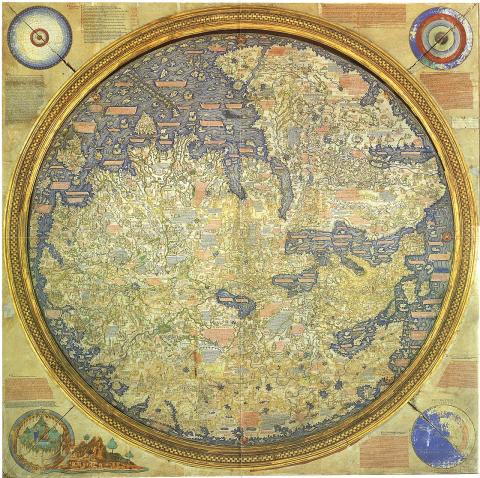Ethan Ganesh Warren, Christopher Waldo, and Nandini Pandey
August 16, 2021
For this installment of the SCS Blog, Chris Waldo asked Nandini Pandey and Ethan Ganesh Warren to compare notes about their experiences as South Asians in classics. Ethan, a current classics Ph.D. student at UT Austin, started Latin at the Brookfield Academy in Wisconsin and earned a B.A. from Rochester. Nandini is currently transitioning to a position at Johns Hopkins after seven years as an Associate Professor of Classics at the University of Wisconsin-Madison. She and Ethan first met years ago over coffee in Madison. This transcript has been lightly edited for length and clarity.
Nandini: Ethan, it’s a great pleasure to get to speak to you today…because you and I first interacted in 2018. You’d grown up in Wisconsin, and you were finishing your undergrad at Rochester, and you had just read an article of mine on Eidolon on “turning the tables on dominance and diversity in Classics.” And it meant so much to me that you reached out.
Ethan: Yeah, your experience really resonated with me. To actually read from someone about things that I’ve experienced that was really significant to me. [Other pieces we both love are this introduction to the Asian and Asian-American Classical Caucus or AAACC by Stephanie Wong, this piece by Yung In Chae, and this one by Yousuf Chughtai.]
Nandini: In an ideal world, I would hope that other minority classicists wouldn’t be feeling that they’ve gone through similar things. I’m curious to learn more from your generation…What experiences have you had in the field…that felt racialized or that made you feel conscious of your own status as a person of color?
Ethan: One thing is just surprise from people when they see a brown man named Ethan in classics. And I get a lot of questions like, “How did you get into classics? What does your family think?,” et cetera, and I definitely get those questions at a higher clip than my white colleagues. I started Latin in seventh grade, so fairly young, and did it all throughout high school. My parents both wanted me to take Latin because it looked good on a college résumé. As I started taking more and more classes, my teachers encouraged me to get involved in Junior Classical League, and I really, really loved JCL. I got really involved with it on a school level, on a state level, and on a national level. So I made friends from all around the country, some of whom I’m still friends with today. Then in college, I started off wanting to be a double-major in chemistry and classics. But I soon realized that I just really love classics and that was really what I wanted to do. So I switched over full-time to that in my sophomore year. And I kept working at that. And now I’m here in graduate school.
Nandini: What was it about this community that JCL offered that drew you in?
Ethan: I think both how welcoming and diverse the JCL community was. One thing that’s always surprised me is how diverse JCL is, but how non-diverse the classics community in general is once you get up into higher education. I felt like JCL was somewhere where I wasn’t really judged for the color of my skin, because everyone had a different background, and we were all there because we loved classics and bonded over that.
Nandini: Because you brought it up earlier: how did this go over on the home front? Because there was a rebellious part of me that liked doing something that was not very practical.
Ethan: The first reaction was fairly negative. My parents want what they perceive to be the best for me, and they made a lot of sacrifices coming to the U.S. from India. But I said, you guys made those sacrifices for us to have a better life, right? And part of that better life isn’t just financials, it’s the ability to have a choice in what you want to do and be able to pursue your passion. And this is what I want to do. And I think after several months’ conversations, it finally got through to them and they accepted it. And as I have progressed more and more, and they started to see that I was pretty decent at this thing, then they were more accepting of it.
Nandini: As you know, there’s this huge “discourse” about race and decolonization in Classics. What stops somebody…from hearing your experience and saying, well, this is a kid that didn’t need or want to talk about race when they were beginning classics?
Ethan: I think race is a topic that should be talked about in really any field. But one thing that I would caution people about is when you’re having discussions of race, not to center it around the one person of color in class, not to look to the one person of color in class for approval or ask them, without their consent, to show or talk about their experience. Because even though you have good intentions, you may be doing more harm than good, because you’re making them feel more isolated. Another thing that’s frustrating is that a lot of people see classics as sort of a brotherhood — so it’s a lot of the same people mentoring people that look like them or think like them or act like them. And when the majority of people in academia are white and male, that…can end up making people of color feel more isolated.
Nandini: Absolutely. I would add first-generation college students and other people who might not have been brought up knowing the unspoken expectations [of academia].…How do we square the need to make things less exclusionary with the genuine sense of community that we get from things like JCL or attending an annual meeting with our friends?
Ethan: That’s a tough question, and I definitely don’t have all of the answers. I think one important thing is to always be conscious about how you’re acting, how you’re talking to people. It’s a natural thing to flock towards people that you perceive to have shared similarities with. But if those similarities are only surface level — gender, race, things like that — you’ll be missing out on people [with whom you may have deeper connections, or who] might have different ideas that can help you see things in a different light and help evolve your thought process.
Nandini: This idea of being attracted to people like yourself [maps on to the ways some Westerners relate to Greco-Roman antiquity as similar or ancestral to their own cultures]. It also makes me compare and contrast the ways that we have had to operate in the world as children of immigrants. I suspect that from a very young age, people like you and me and our other visibly minoritized friends…have gotten used to doing all this extra work of code-switching and meeting people where they are.
Ethan: This is especially important with the strong percentage of students that are international or children of immigrants.…By 2060, the U.S. will be over 50% non-white. And…with this [increasingly] diverse student body, we really need to think about how we teach the subjects. Not necessarily teaching that we should learn classics because it pertains to our Western civilization or Judeo-Christian roots, but looking at similarities between the Aeneid, say, and the Mahabharata or other texts that relate to a broader audience.
Nandini: An increasing percentage of my students are foreign nationals…and they often say that they’re taking classes in “Western Civ”…because they want to learn more about the European cultures that are the roots of American culture. And I can see why that would appeal. But at the same time, does it square with what we’re saying in the “discourse,” that we can’t assume that there’s an intrinsic value to “Western culture”? Do you have any advice for teachers who want to reach more diverse students as we work through this unique moment in world politics?
Ethan: There are many, many students from different cultural backgrounds who are taking classics courses, and you’re not going to be able to know everything about everyone’s culture. But there are so many amazing articles, whether it’s [on Eidolon] or on the SCS Blog or on Medium: people’s shared experiences and people’s journeys into classics. And I think educating yourself on those different things will help you become a better educator.
Nandini: As a grad student who is also a person of color and a teacher, what’s your take on “the discourse”?
Ethan: I think the discourse is mostly beneficial because it puts more eyes onto this issue that isn’t new and is not going away anytime soon. I think where the discourse can be potentially problematic is when it turns performative, when people start discussing all of the things that they’re doing and self-congratulating themselves for helping out. The focus should be on under-privileged communities.
Nandini: Absolutely; there’s so much white savior thinking and also a lot of defensiveness. What reasons for hope do you see for minorities entering the field?
Ethan: I guess reasons for hope in the field include conversations like this and a newer generation being more vocal and more active in matters like this.
Nandini: Honestly, that’s where my hope comes from too. There was a recent SCS blog by Daniel Libatique where he talks about the democratizing influence of Twitter, where it’s now not the same people at the top of the hierarchy that are controlling the conversations and who’s in them. There’s…a great amount of power and passion and competence and creativity and energy coming from “below.” I really hope that older people will always be able to keep an open mind and learn from the students that we’re working with.…I also want to point to groups like the Mountaintop Coalition and AAACC and the tremendous job they’re doing in their mentoring systems. I’m curious whether you find that the rise of groups aimed to support minorities — has that changed your perception of the field or enhanced your comfort level in the field? What do you think is different about this landscape now in 2021 that wasn’t there yet when you started classics?
Ethan: These groups have definitely been very beneficial for students of color and for the field in general. But I also think that they can do more to help with the students that are from backgrounds that are underrepresented, even in those groups. So, for example, in AAACC, I see a lot of people who are East Asian or Southeast Asian and not really many people who are South Asian. And that’s something that I really wanted to see change, and that was one of the primary reasons for me applying as well [in a successful bid to serve as Financial Officer]. So I think there’s definitely more work to be done.
Nandini: That’s great. What would you say if we predicted the criticism that it’s all going to become just identity politics and being your particular brand of Asian.…Is there a potential for too much fracturing or too much thinking about our personal experiences? Could it detract from our community or solidarity both with other minorities and with classics as a field?
Ethan: I think that there definitely is that potential, but we’re not even close to there. When I have meetings with people in the AAACC…I can still relate to the stories that they’re telling because we do have a shared Asian identity. My identifying as a South Asian doesn’t take away from that, and, as a minority, you can still relate to people’s stories as [children] of immigrants. I don’t think identifying as something is necessarily bad.
Nandini: Right. And I don’t think lifting up one person’s voice or hearing from one group takes anything away from others…I think that we’ll all have more if we are able to make our experiences relevant [to classics, and to one another, and to the modern world].
Authors




